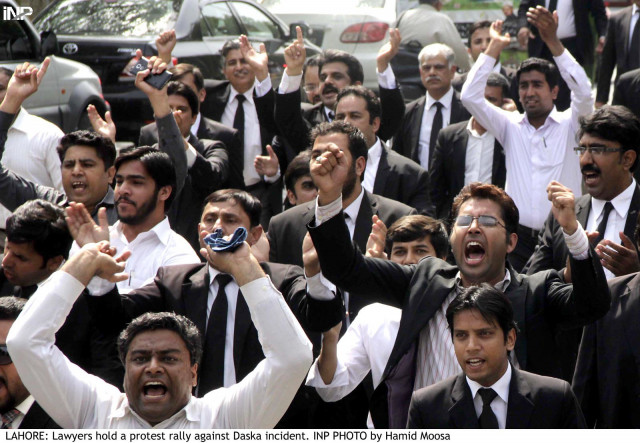Law-enforcers or lawbreakers?
Police, whose duty it is to maintain law and order, seem to have decided to enforce their version of rule of law

Lawyers stage a protest against killing of their colleagues in Daska, Sialkot. PHOTO: INP
The police, whose duty it is to maintain law and order even at the risk of their own lives, seem to have decided to enforce their version of rule of law even if it means putting at risk the lives of those very people whom the police are supposed to protect from lawless elements. This kind of blatant display of impunity was first demonstrated in recent times last year when on June 17, 2014, actions of the Lahore police led to the killing of 14 persons while meeting resistance to their attempts to remove barriers placed in front of the Minhajul Quran secretariat in Model Town. The judicial commission appointed at the time to inquire into the incident held the Punjab government directly liable for the bloody incident and fixed the responsibility on Punjab Chief Minister Shahbaz Sharif and the then law minister, Rana Sanaullah. However, the commission report was ostensibly suppressed and a Joint Investigation Team (JIT) was formed. This team gave clean chits to both the chief minister and the then law minister and conveniently fixed responsibility on some junior police officials and that, too, of only resorting to firing on being fired upon.
Obviously, such JIT reports end up encouraging the police to continue their brutal ways of doing things rather than making them more careful in their future outings on such missions. In the case of the Karachi incident, the SHC has asked senior provincial officers to name the authority under whose directions the high court was cordoned off and masked men in plain clothes authorised to participate in the operation. In the Daska incident, the SHO who is alleged to have fired and killed the two lawyers has been arrested and a committee has been formed to investigate into the incident. Going by past experience, very little is expected from the judicial efforts being made to find out what exactly had happened in the two incidents and who had masterminded them.
A culture of highhandedness and brutality has become entrenched in our police force, especially in Sindh and Punjab. And this culture encourages the members of the institution to disregard the law and act on behalf of vested interests — the interests that in the first place had facilitated their recruitment on political grounds. So instead of abiding by the law, the politicised police force serves the vested interests of its political masters.
And since recruitment in the police had been done on political grounds, very little if at all any attention is paid to their proper training. So, one can hardly expect anything other than such a gung-ho gun culture from an untrained and politicised police force. The police are, indeed, one of the main contact points between the citizens and the state, and the less than pleasant experience that citizens have in their interaction with the police is one factor that many people end up being alienated from the state itself.
Published in The Express Tribune, May 31st, 2015.
Like Opinion & Editorial on Facebook, follow @ETOpEd on Twitter to receive all updates on all our daily pieces.















COMMENTS
Comments are moderated and generally will be posted if they are on-topic and not abusive.
For more information, please see our Comments FAQ